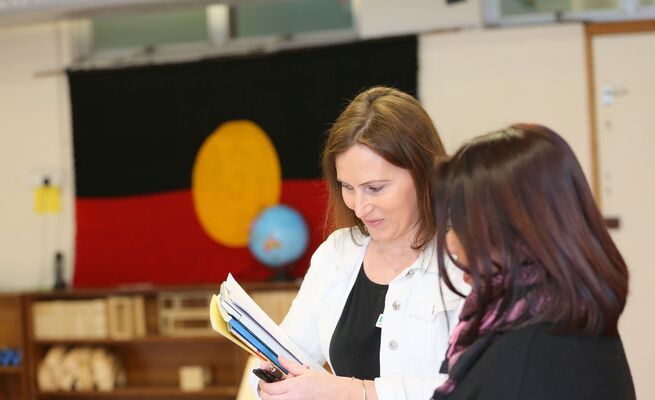Advocacy
A definition of advocacy
Advocacy involves speaking up and acting to defend and promote the rights, needs and interests of others. Young children may need adults to advocate on their behalf to support and promote their rights and voices in a range of ways.
Why is advocacy an important part of inclusive practice?
Educators are in the unique and privileged position of spending large amounts of time educating and caring for children. They therefore have many opportunities to advocate for children's rights, best interests and inclusion and support families to do so, both within and beyond the early childhood setting. There are powerful ways educators can and should advocate for all children, and these may be explicit or so subtle that educators may not recognise this advocacy without reflection.
Incidental advocacy in daily interactions
Advocating for all children happens in daily interactions. Educators make a multitude of choices each day when interacting with others that support children's rights, particularly the right to inclusion for children with a disability.
Advocacy with children
Educators can:
- sensitively intervene to support children to learn how to respect the rights of others
- encourage children to view others as valuable
- support children to include all peers, regardless of their abilities and differences
- nurture communication and social skill development
- model what advocacy looks like - a powerful concept for all children to experience
| During play educators observe moments where children may comment on other children, experience conflict with them or exclude them. In these moments, educators make choices as to whether they ignore such situations or use the teachable moment to advocate for fairness and inclusion. These everyday interactions are pivotal in communicating to children the importance of equity and the value placed on the belonging of every child within the preschool. | |
|---|---|
During play educators observe moments where children may comment on other children, experience conflict with them or exclude them. In these moments, educators make choices as to whether they ignore such situations or use the teachable moment to advocate for fairness and inclusion. These everyday interactions are pivotal in communicating to children the importance of equity and the value placed on the belonging of every child within the preschool. |
Advocacy within the preschool team
All educators play a role in advocating for children's rights and inclusion.
In teams where inclusive philosophy and practices are firmly embedded, and educators strongly support the paradigm of inclusion, advocacy for children may emerge naturally. Educators may still experience moments where the need to challenge actions or opinions of others will arise and advocacy will be necessary. Such situations require courage and sensitivity, and the emphasis needs to be placed on acting as a voice for children’s interests.
| Situations where children present with persistent challenging behaviours or other needs that require support, can prompt educators to feel frustrated and concerned (e.g. for the safety of other children and adults), and it is through this lens where they can lose sight of the rights of the child and the value of inclusion. At these times, advocacy for the child is vital. Working cohesively, sharing interactions with all children across the team, focussing on problem-solving and skill development, rather than blaming the child, can promote resolution of issues and uphold the rights of the child to be supported and valued. | |
|---|---|
Situations where children present with persistent challenging behaviours or other needs that require support, can prompt educators to feel frustrated and concerned (e.g. for the safety of other children and adults), and it is through this lens where they can lose sight of the rights of the child and the value of inclusion. At these times, advocacy for the child is vital. Working cohesively, sharing interactions with all children across the team, focussing on problem-solving and skill development, rather than blaming the child, can promote resolution of issues and uphold the rights of the child to be supported and valued. |
Advocacy in communication with parents
Daily conversations with parents and carers provide opportunities for educators to share information in a way which frames the child as a whole and valued person. This is a form of advocacy for the child and also creates a supportive relationship with families where they can see their child is respected and valued. By providing feedback on the child’s participation in a balanced and sensitive manner, parents are more likely to understand about their child’s development in the social context of preschool and the benefits of inclusion.
| There may also be occasions where educators will need to advocate for inclusion when parents make complaints or comments about another child. This can be a highly emotive situation that may arise where their own child has been hurt. It is valuable to actively listen to the concerns and validate these, and to reassure the parent that strategies are in place to support the safety of their child as well as to assist the other child to learn skills to replace challenging behaviour. Maintaining confidentiality, whilst showing sensitivity and empathy, are important in such conversations. At these times, it is vital for the message to be conveyed that the right to inclusion for all children will be upheld. | |
|---|---|
There may also be occasions where educators will need to advocate for inclusion when parents make complaints or comments about another child. This can be a highly emotive situation that may arise where their own child has been hurt. It is valuable to actively listen to the concerns and validate these, and to reassure the parent that strategies are in place to support the safety of their child as well as to assist the other child to learn skills to replace challenging behaviour. Maintaining confidentiality, whilst showing sensitivity and empathy, are important in such conversations. At these times, it is vital for the message to be conveyed that the right to inclusion for all children will be upheld. |
Advocacy in partnership with families: supporting families to be advocates
When educators develop strong and nurturing relationships with children with disabilities and their families, they are in a prime position to support families to advocate for their child's rights with other professionals and settings (such as schools). As early childhood educators are only involved with children for a short period of time, it is important for them to encourage parents to continue to advocate for their child in the long term.
The challenges families may face with ensuring their child is included in the settings they choose, can be significant. Educators can be allies whom parents trust, and their support can help empower parents with the confidence and skills to be advocates throughout their child's life.
Useful resources
Family Advocacy is an organisation in NSW that families may contact to gain support around advocating for their child.
Family Advocacy - click to visit website
The Raising children website has helpful information for families about being an advocate for their child.

